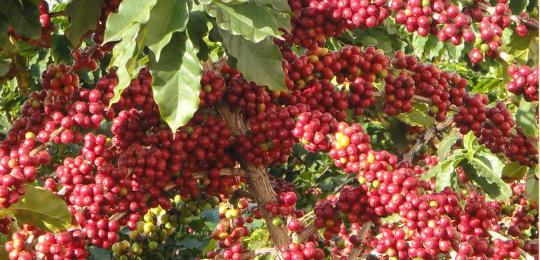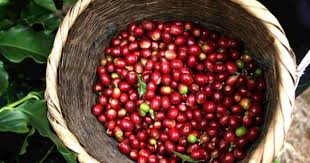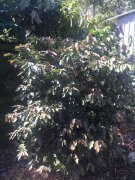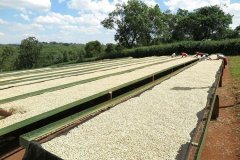Detailed introduction of Yega Sheffield-Michelle Michelle Coffee Cooperative
For professional baristas, please follow the coffee workshop (Wechat official account cafe_style)

Ethiopia Yega Sheffield-Michelle Michelle Coffee Cooperative
Ethiopia is the country where coffee was first discovered. Today, there are still many wild coffee harvested by farmers in the primeval forest. This is a country with poverty, drought and civil war. However, it is still the most important coffee producing country in terms of coffee quality and output, and it is also the best and top coffee producing country. Coffee is mostly traditional Arabica species, with an annual output of about 350000 tons and more than 70% exported to countries around the world. About 15 million people in the country are engaged in coffee-related industries, and more than 90% of the farms or cooperatives belong to small-scale farming. In 2008, crops produced in Ethiopia, including wheat, corn, sesame and coffee, were fully imported into the ECX Trading system (Ethiopian Commodity Exchange) to replace the existing auction and export methods. Coffee farmers or cooperatives deliver coffee to warehouses concentrated in ECX. Beans of the same grade and the same producing areas will be mixed together and then auctioned directly. You don't know which farmers or cooperative producing areas are produced. Farms that originally cooperated with foreign raw bean merchants cannot continue to develop, such as misty Misty Valle Manor, which actually has no effect on yield and quality, and it is easier to tell the quality of coffee by price. Coffee and bean merchants can not track the freedom to obtain satisfactory profits [low price and high quality], because coffee beans that do not pass through the ECX trading system will be heavily taxed. Nowadays, more than 90% of the coffee is through this trading system, but it is not a good thing for buyers who love fine coffee. ECX has launched the DST (Direct Specialty Trade) system since the beginning of 2010. The DST system is an irregular Ethiopian auction. Only specialty coffee, a boutique coffee with a SCAA cup test standard of more than 80 points, can trade with foreign raw bean merchants under the name of its own farm or cooperative, and estates with small quantity and quality that continue to be praised are the targets for purchase.
Ethiopian coffee can be divided into two treatments. Washing treatment method II. Natural sun treatment. Nowadays, every cooperative or even a small coffee farm in Ethiopia produces coffee beans of the above two treatments at the same time, whether it is the well-known Yegashifi producing area in Taiwan or the Sidamo producing area. Not only that, in Ethiopia, which is currently the country with the fastest development of coffee, it not only makes coffee different in treatment, but also makes aroma and taste different due to the adjustment of different techniques and processes. Ethiopian coffee beans washed with water have high consistency in fragrance, temperature and soft low-key flavor with low citric acid, while Ethiopian coffee beans with sun-drying method have a high consistency in taste. The fragrance is strong and conspicuous the weak and inconspicuous flavor of citric acid is complex and changeable, characterized by the aroma of flowers or fruit.

Michelle Michelle Cooperative Coffee Cooperative is located in Dilla Zuria district province on the north bank of Lake Lake Abaya in Yegashefi, Ethiopia. Its 2191 members produce 7900 bags of coffee beans a year, including sun and water-washed beans. Coffee grows in the mountains at an altitude of 1900-2300 meters. It is a traditional local coffee variety and is a partner of the Fair Trade Association in Ethiopia.
From the long rice-shaped appearance of coffee beans, we can see that they are Ethiopian coffee beans, and we can also see that they are washed beans after watching the color.
Smelling the unique fragrance of jasmine tea and very clean and long sweetness, I fully understand the difference between Yejiaxuefei and Sidamo.
Property Characteristics: farm characteristics
Farm Farm name: Michelle Coffee Farmers Cooperative Union
Farmer Farm owner: Various small producers different kinds of small farmers
City City: Dilla Zuria district
Region producing area: Yirgacheffe Yega Xuefei producing area

Country country: Ethiopia
Altitude altitude: 1900-2300 m
Farm Size Farm area: 2191 members
Certification Certification: Fair Trade Fair Trade Association
Coffee Characteristics: coffee characteristics
Variety varieties: local traditional varieties of Heirloom
Processing System treatment: Washed washing and drying on the scaffolding
Aroma / flavor flavor: Rice, tea, jasmine, bergamot bergamot, peach, rose perfume, chamomile, flowers and plants
Acidity: very fresh, clean, elegant, citrus, lemon, berry, organized sorting structure, lively sour taste
The complexity of complex is similar to that of other: well-balanced, complex, long aftertaste, very sweet and silky
Important Notice :
前街咖啡 FrontStreet Coffee has moved to new addredd:
FrontStreet Coffee Address: 315,Donghua East Road,GuangZhou
Tel:020 38364473
- Prev

Detailed introduction of Rushashi producing area in Rwanda-Duhingekawa Women's Cooperative
Professional barista exchanges please follow the coffee workshop (Wechat official account cafe_style) Rwanda Rushashi producing area-Duhingekawa Women's Cooperative Rwanda is located in the heart of the interior of Africa, its mountain terrain is fertile land, as well as ancient traditional bourbon species, indicating that the natural environment needed to grow quality coffee beans can be found everywhere in Rwanda. Coffee was made in Germany in 1904.
- Next

Tanzania-Luwaita Cooperative Cooperative introduces baking advice
For the exchange of professional baristas, please follow the coffee workshop (Wechat official account cafe_style) Tanzania-Luwaita Cooperative cooperative East Africa is the producer of many fine coffee, including Kenya, Ethiopia, Rwanda, etc. Tanzania is another country that produces good coffee in East Africa. Tanzania is located in East Africa and borders India with seven countries.
Related
- Does Rose Summer choose Blue, Green or Red? Detailed explanation of Rose Summer Coffee plots and Classification in Panamanian Jade Manor
- What is the difference between the origin, producing area, processing plant, cooperative and manor of coffee beans?
- How fine does the espresso powder fit? how to grind the espresso?
- Sca coffee roasting degree color card coffee roasting degree 8 roasting color values what do you mean?
- The practice of lattes: how to make lattes at home
- Introduction to Indonesian Fine Coffee beans-- Java Coffee producing area of Indonesian Arabica Coffee
- How much will the flavor of light and medium roasted rose summer be expressed? What baking level is rose summer suitable for?
- Introduction to the characteristics of washing, sun-drying or wet-planing coffee commonly used in Mantenin, Indonesia
- Price characteristics of Arabica Coffee Bean Starbucks introduction to Manning Coffee Bean Taste producing area Variety Manor
- What is the authentic Yega flavor? What are the flavor characteristics of the really excellent Yejasuffi coffee beans?

